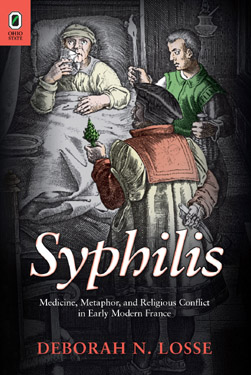SyphilisMedicine, Metaphor, and Religious Conflict in Early Modern FranceDeborah N. Losse |  1/22/15 LITERARY CRITICISM / European / French 200 pp. 6x9  $51.95 cloth 978-0-8142-1272-1 Add cloth to shopping cart $24.95 paper 978-0-8142-5206-2 Add paper to shopping cart $14.95 CD 978-0-8142-9377-5 Add CD to shopping cart Shopping Cart Instructions Review/Change Shopping Cart & Check-out | |||
|
Explore More Wellcome Images (search von Hutten) Société de l’Histoire du Protestantisme Français Société Internationale des Amis de Montaigne Syphilis — Its Early History and Treatment Until Penicillin and the Debate on its Origins |
“Deborah N. Losse’s Syphilis: Medicine, Metaphor, and Religious Conflict in Early Modern France is a pleasure to read. The book covers a period that spans multiple writers, genres, and geographical contexts within France and provides individual readings and broader interlocking conclusions that are keen and balanced, ultimately showing how the force of metaphor is central to texts by Erasmus, Montaigne, and Rabelais, among others. What she says, if a pun on the pox can be offered, is spot-on. The spots that are her wit and observation, like the malady itself, need to spread! Far from being a sign of plague, the result will be a healthy delight. This is a valuable contribution to the fields of epidemiology and literature in sixteenth-century France.” —Tom Conley, Abbott Lawrence Lowell Professor of Romance Languages and Literatures and of Visual and Environmental Studies, Harvard University “This book is excellent and superbly wide-ranging in scope. I delighted in the combination of Rabelais with Erasmus, Léry with Thevet, and Ronsard with d’Aubigné; these interesting connections across disparate areas and geographies are the primary fascinating contribution of the work.” —Randolph Paul Runyon, Miami University In Syphilis: Medicine, Metaphor, and Religious Conflict in Early Modern France, Deborah N. Losse examines how images of syphilis became central to Renaissance writing and reflected more than just the rapid spread of this new and poorly understood disease. Losse argues that early modern writers also connected syphilis with the Wars of Religion in sixteenth-century France. These writers, from reform-minded humanists to Protestant poets and Catholic polemicists, entered the debate from all sides by appropriating the disease as a metaphor for weakening French social institutions. Catholics and Protestants alike leveled the charge of paillardise (lechery) at one another. Losse demonstrates how they adopted the language of disease to attack each other’s politics, connecting diseased bodies with diseased doctrine. Losse provides close readings of a range of genres, moving between polemical poetry, satirical narratives, dialogical colloquies, travel literature, and the personal essay. With chapters featuring Erasmus, Rabelais, Montaigne, Léry, and Agrippa d’Aubigné, this study compares literary descriptions of syphilis with medical descriptions. In the first full-length study of Renaissance writers’ engagement with syphilis, Losse charts a history from the most vehement rhetoric of the pox to a tenuous resolution of France’s conflicts, when both sides called for a return to order. Deborah N. Losse is professor emerita of French in the School of International Letters and Cultures at Arizona State University in Tempe, Arizona. | |||

